How to handle Stress ?
Health is Wealth ( Small Changes Big Impact )

Stress is more prevalent than ever in contemporary culture. When a person feels that a situation is too demanding or overwhelming for them to handle, they are under stress.
It is an intricate physiological and psychological reaction that involves the brain’s communication with the body. The body’s stress response system is triggered when a stressor, such as a physical danger, an emotional challenge or mental strain is present.
Stress chemicals like cortisol and adrenaline. which prime the body for action, are released as a result. Muscles tense up, breathing quickens, pulse rate rises, and senses become more acute.
While this reaction can be advantageous for brief periods of time, prolonged or chronic exposure to stressors without adequate recuperation can have detrimental effects on both physical and mental health.
Management of stress
some live factors that are causing stress ?
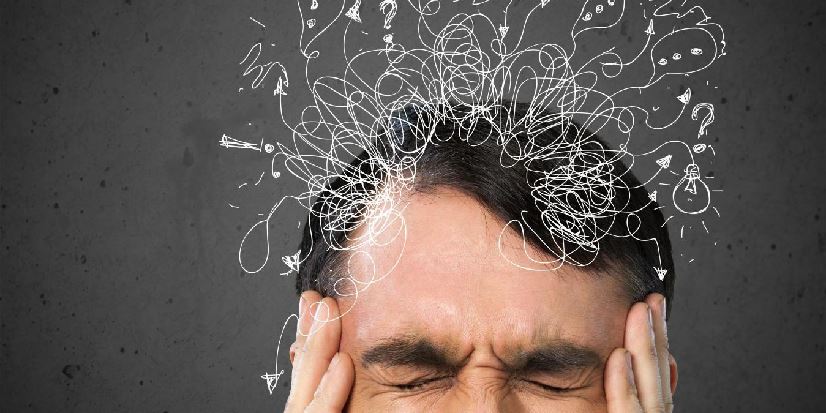
Fast paced lives

A lot of people live fast-paced lives filled with many duties and responsibilities, including hard employment, family responsibilities, and social demands. Chronic stress might develop as a result of having to balance these obligations constantly.
Technological Developments
While technology has improved our quality of life in many ways, it has also eroded the distinction between our personal and professional lives. The expectation of constantly being available and constant connectivity provided by cellphones might lead to a constant state of being “on” and higher levels of stress.
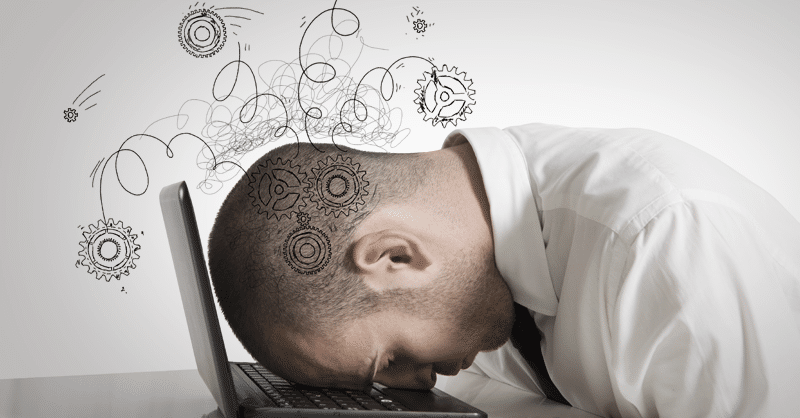
Management of stress
Overloading of Information

We are currently experiencing an information overload as a result of the digital age, which has made information easily accessible at our fingertips. Maintaining a steady stream of notifications, social media updates and news can make it stressful and overwhelming.
IMPORTANT – 74% Of Indians Experience Stress, While 88% Experience Anxiety. The Survey Found That 57% Of Respondents Experienced Mild Stress, 11% Experienced Moderate Stress, 4% Experienced Moderately Severe Symptoms Of Stress And 2% Experienced Severe Stress.
Economic Pressure
For many people, money worries, job insecurity, and economic instability are major sources of stress. Chronic stress can be brought on by the pressure to fulfil financial responsibilities, find employment, and achieve economic stability.

Management of stress
Social Comparison and Perfectionism

Social media sites frequently present idealised depictions of people’s lives, fostering emotions of inferiority and social comparison. Stress can be significantly increased by the desire for perfection and the worry that one will fall short of social expectations.
It is commonly known that stress has a negative effect on health. Long-term or persistent stress can result in a number of physical and mental health issues :-
Cardiovascular Problems
High blood pressure, heart disease, and a higher risk of heart attacks and strokes can all be attributed to chronic stress.
Immune system Suppression
Stress hormones can weaken the immune system, making people more prone to infections, diseases, and sluggish healing.
Mental Health Diseases
Long-term stress is linked to a higher risk of mental health disorders such depression, anxiety disorders, and burnout.
Digestion Problems
Stomachaches, indigestion, irritable bowel syndrome (IBS) and other gastrointestinal illnesses can result from stress’s impact on digestion.
Management of stress
Sleep Disturbances
Stress can interfere with sleep cycles, causing insomnia, trouble falling asleep, or frequent nighttime awakenings. Low-quality sleep can make stress levels much worse.
Cognitive Impairments
Prolonged stress can impair cognitive functioning overall by affecting memory, focus and decision-making skills.
In order to reduce these harmful health impacts, managing stress and putting appropriate coping mechanisms into place are essential. Some efficient methods for lowering and managing stress levels for improved general health and well-being include regular physical activity the use of relaxation techniques (such deep breathing or meditation), keeping a balanced lifestyle, looking for social support and placing a high priority on self-care.
How to Handle stress at Work ?

Work and stress have a substantial and frequently entwined relationship. The stress a person experiences as a result of their employment or work environment is referred to as work-related stress.
Management of stress
some key aspects
Demand of jobs
Stress can be exacerbated by excessive job demands. such as large workloads, short deadlines, high expectations or competing obligations. Chronic stress can develop when an individual’s capacity to handle the demands of a job is regularly exceeded.
work load and time pressure
Having an overwhelming amount of work or constantly feeling pressed for time can create stress. When there is an imbalance between the demands placed on a person and the resources available to meet those demands, stress can result.
work-life balance
Achieving a healthy work-life balance can be challenging. which can increase stress. Feelings of overwhelm, exhaustion, and a lack of time for relaxation and self-care can result when job obligations infringe upon personal time and commitments.
Role conflict and ambiguity
Conflicting expectations or ambiguous job roles can be a major source of stress in the workplace. Employees may experience stress and emotions of confusion if they are unclear about their roles or if they receive contradictory instructions or comments.
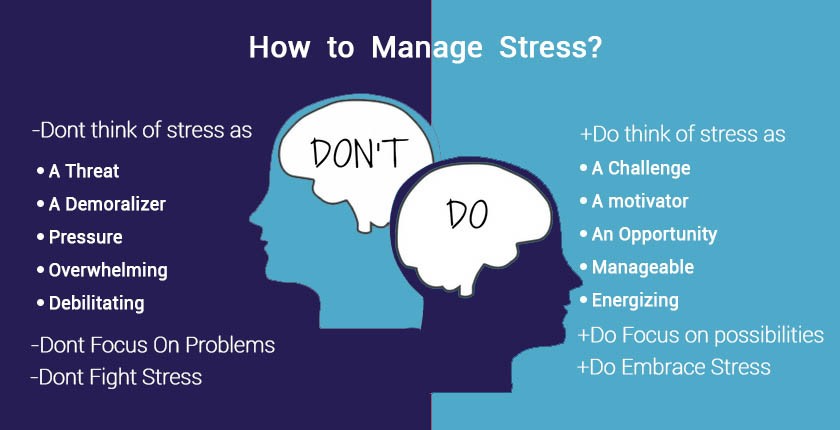
Management of stress
Organizational culture and support
Stress levels at work can be influenced by organisational culture, management style, and support systems. Stress can be reduced by having a supportive and encouraging work atmosphere, good communication, appreciating the efforts of the employees and having resources available.
Job control and autonomy
Stress levels can be influenced by the degree of autonomy and control an individual has over their employment. Employees may experience more stress if they feel micromanaged, lack autonomy or have limited power over decision-making.
Interpersonal Relationships and conflicts
Stress can be exacerbated by difficult interpersonal interactions with coworkers, confrontations with superiors, or a lack of social support at work. A harsh work atmosphere and strained relationships can have an effect on everyone’s well being.
Career development and Growth opportunities
Stress and dissatisfaction at work can result from limited options for progress or a lack of career growth prospects. Frustration and tension can be exacerbated by feeling stuck or unappreciated.
How stress affects health ?
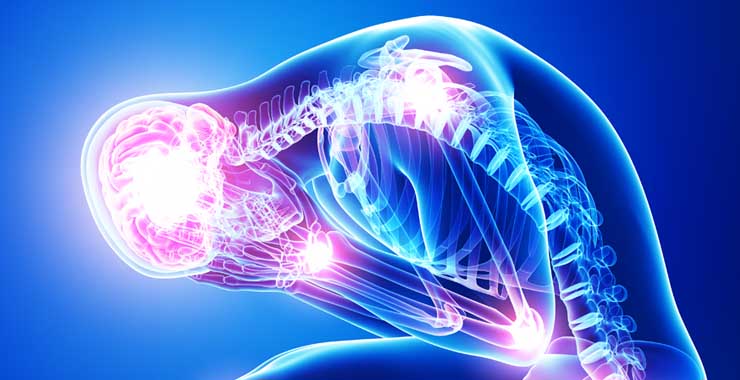
Stress can have a profound impact on both physical and mental health. When the body experiences stress, it activates the stress response system, releasing stress hormones such as cortisol and adrenaline.
Management of stress
Cardiovascular health
Prolonged stress can result in high cholesterol, high blood pressure and an accelerated heartbeat. These elements have the potential to raise the risk of heart disease, heart attacks and stroke over time.
Immune system Operation
Stress can impair immune function, leaving people more vulnerable to infections, diseases and sluggish healing. It may lessen the body’s defences against bacteria, viruses and other infections.
Mental health
Long-term stress is linked to a higher risk of mental health conditions such depression, anxiety disorders, and burnout. Additionally, it may worsen pre-existing mental health issues, resulting in a deterioration in general well being and functioning.
Digestive system
System of the digestive tract. Stress can impact the digestive process and aggravate gastrointestinal problems such heartburn, indigestion, stomachaches and irritable bowel syndrome (IBS). It may interfere with nutrition absorption and upset the equilibrium of gut microorganisms.
Sleep Disturbances
Stress can interfere with sleep cycles, causing insomnia, trouble falling asleep or frequent nighttime awakenings. Stress levels can be made worse by getting poor sleep, which also affects cognitive abilities.
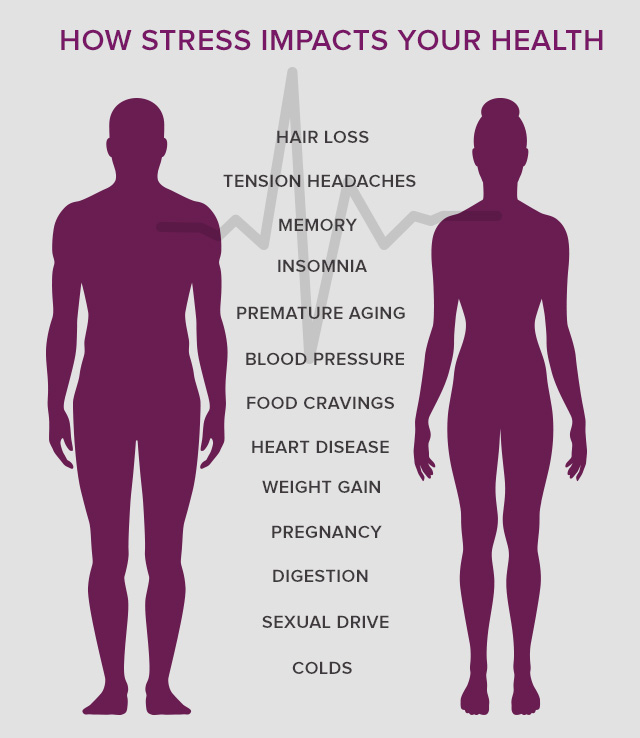
Management of stres
Changes in weight and appetite
Changes in weight and appetite are caused by stress, which can cause overeating or a loss of appetite. It might also increase the desire for unhealthy foods, particularly calorie-dense comfort foods. Based on how each person reacts, these factors may cause weight increase or decrease.
Cognitive Function
Prolonged stress can affect one’s capacity for memory, concentration, and judgement. It can make it difficult to concentrate, effectively process information and carry out duties.
Musculosketal health
Stress can lead to muscle tension, which aggravates headache, migraine, neck, and back pain symptoms. Long-term muscle tension can cause discomfort and suffering.
Skin issues
Skin conditions including acne, eczema, psoriasis, and hives can be brought on by stress or made worse by it. It might damage the skin’s natural barrier and aggravate irritation.
where stress come’s from ?
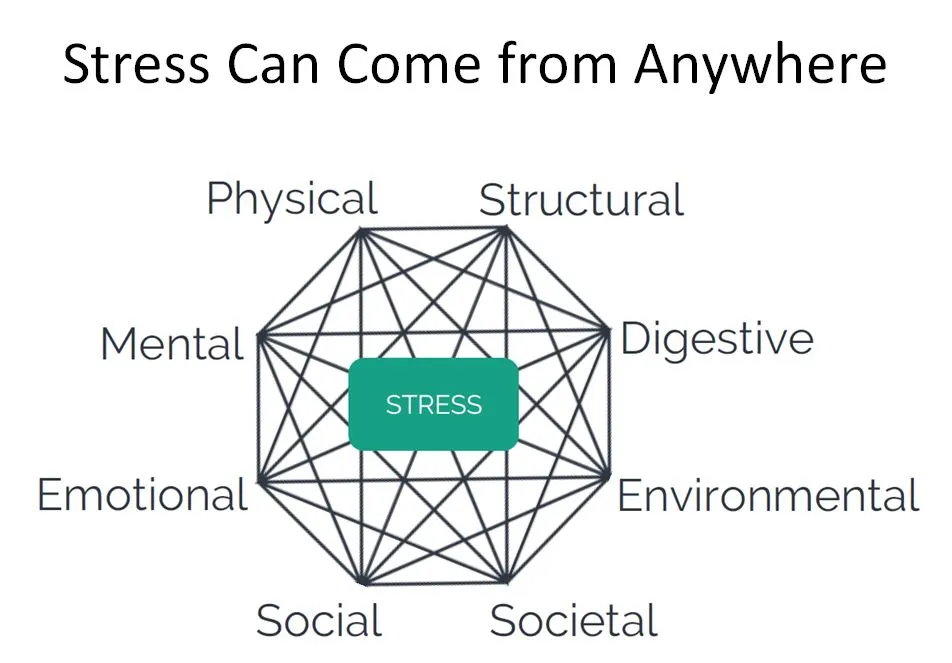
Management of stress
Stress can result from a variety of situations and sources. These stresses can be divided into several groups, including:
Environmental Stressors
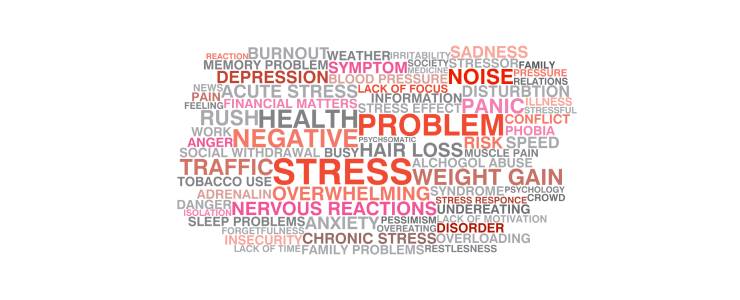
Stress-inducing elements in our immediate environment include things like noise, pollution, crowded conditions at home or at work, and unpleasant living or working conditions.
Social stressors

Social dynamics and interpersonal connections can be major sources of stress. Stress can be exacerbated by arguments with family members, friends, or coworkers, social isolation or having to navigate challenging social settings.
work related stressors
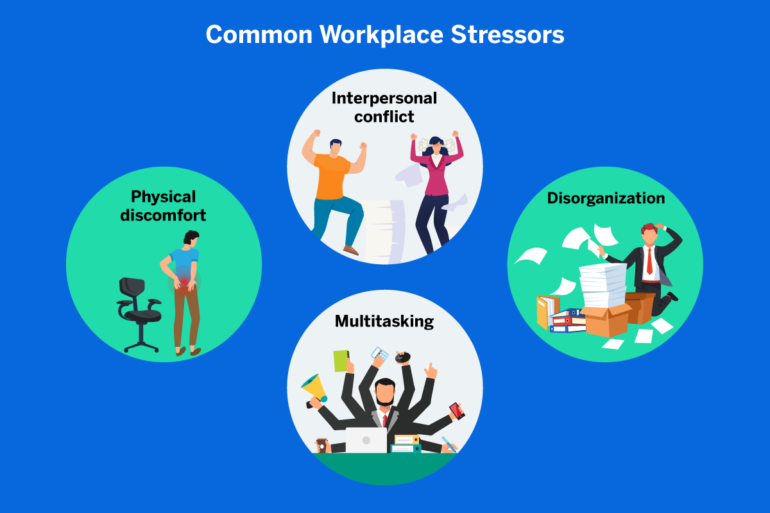
Stress factors at work include demands of the job. an excessive workload, long hours, pressed deadlines, a lack of control over tasks, disagreements with coworkers or managers and job uncertainty.
Management of stress
Significant life events and transitions

Stress can be brought on by significant life events or transitions like the death of a loved one, divorce, relocating to a new city, beginning a new job or financial issues. These situations frequently necessitate adaptation and adjustment. which raises stress levels.
internal stresses
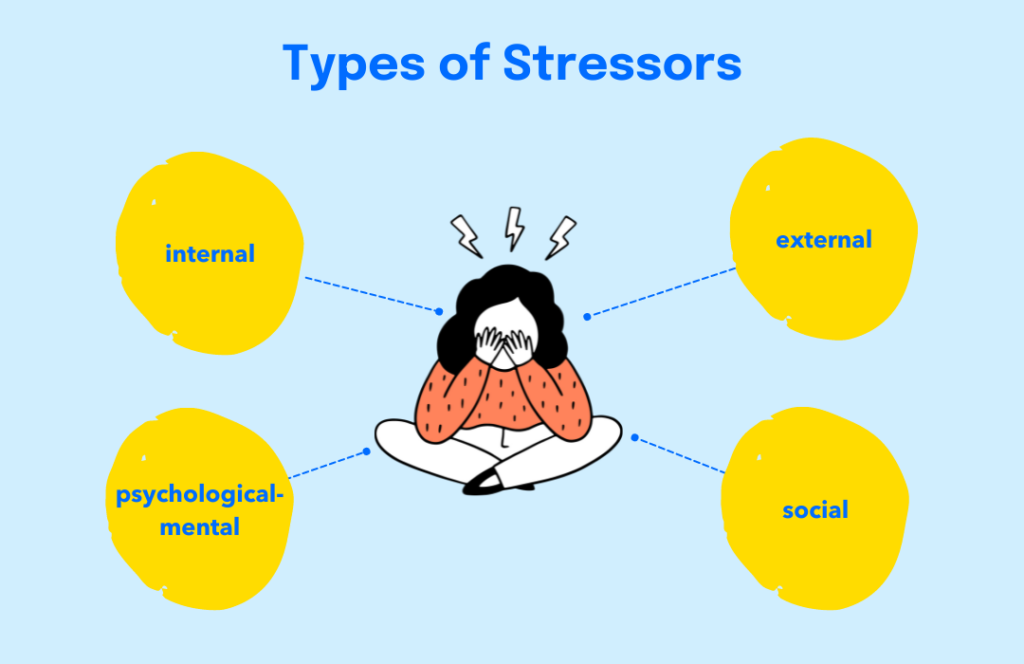
These pressures originate within and frequently entail both cognitive and emotional components. Internal stress can be exacerbated by negative self-talk, perfectionism, excessive concern, irrational expectations or a propensity to overthink things.
Health-related stressors
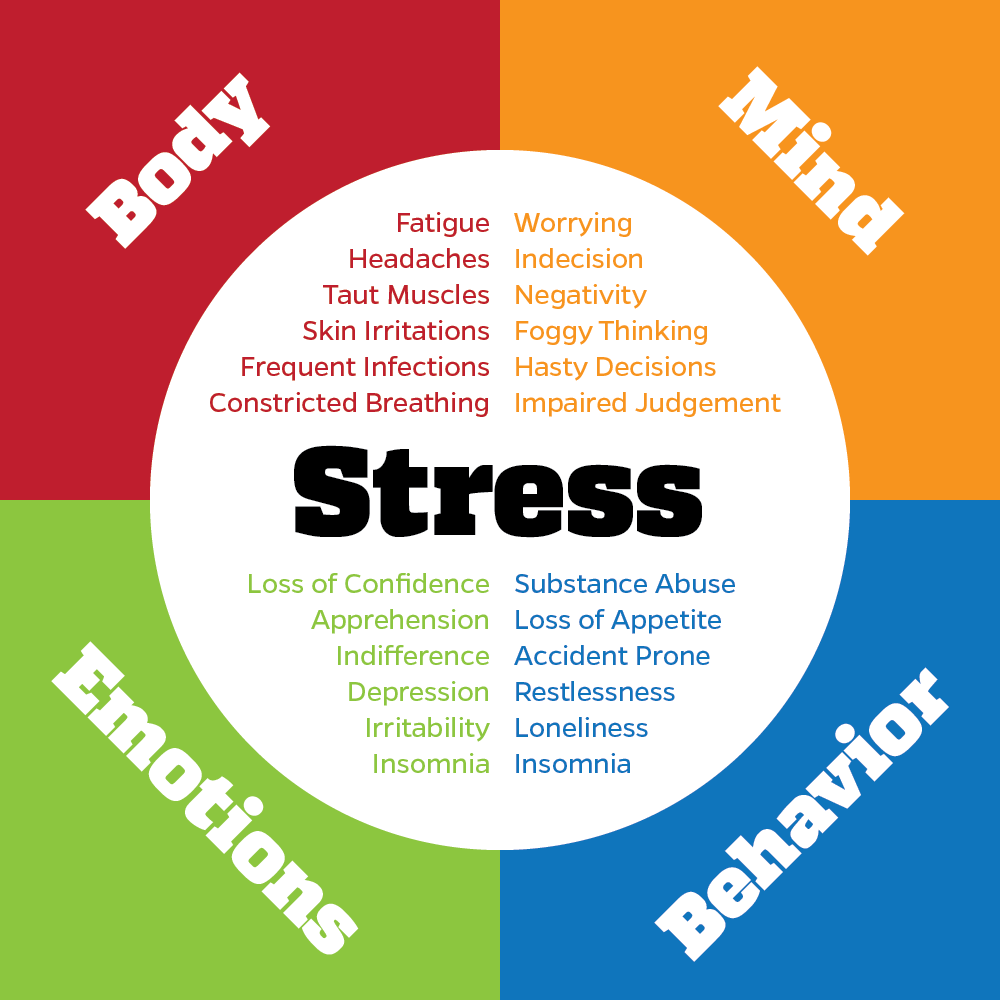
Managing a disability, dealing with a chronic illness, or going through physical pain can all be very stressful. Stress can also be brought on by medical procedures, treatments or uncertainty pertaining to one’s health.
Management of stress
Financial stressors

Financial pressures can be quite stressful, including debt, job insecurity, unemployment, or financial instability. Stress can persist because of worries about paying bills on time and supporting oneself or one’s family.
Remember That What Might Be Difficult For One Individual Might Not Be As Distressing For Another. Each Person Reacts And Has A Different Threshold For Stress. In Order To Manage And Lower Stress Levels, It Might Be Helpful To Identify The Sources Of Stress In One’s Life And Create Efficient Coping Mechanisms.
How to treat it ?
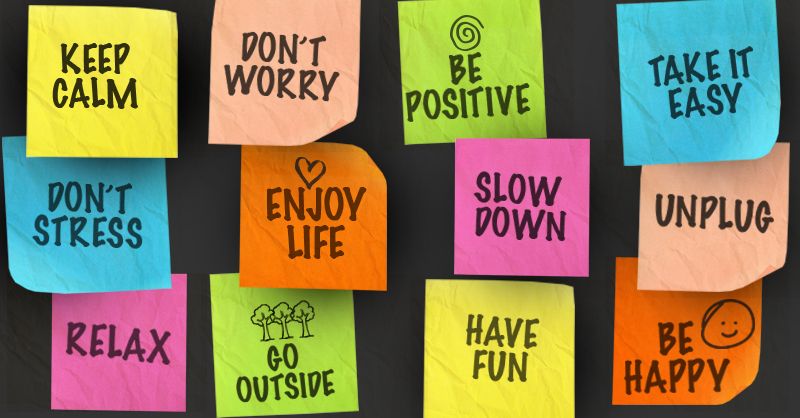
There are numerous methods and strategies that can be used to control and lower stress levels. Here are a few suggestions for relieving stress:
self-care and life adjustments

Changes to one’s lifestyle that encourage relaxation, well-being and stress reduction should be given first priority. Exercise regularly, consume a healthy diet, get enough sleep, and utilise relaxation techniques like deep breathing or meditation.
management of stress
Time Management
To prioritise tasks, create reasonable goals, and prevent over committing yourself to your workload, develop good time management skills. To keep organised, divide major jobs into smaller, more manageable steps and make a timetable or to-do list.

Social support

Seek out social help from your friends, family, or support organisations. Speaking with someone about your stressors might help you feel better emotionally and provide new insight and ideas for solutions. Be in the company of upbeat, understanding people who may inspire you and provide insight.
Healthy coping strategies
Healthy coping strategies Instead of resorting to destructive behaviours like binge drinking or substance misuse, try to find healthy ways to deal with stress. Consider indulging in stress-relieving activities like hobbies, music listening, reading, spending time in nature, or using your creativity.
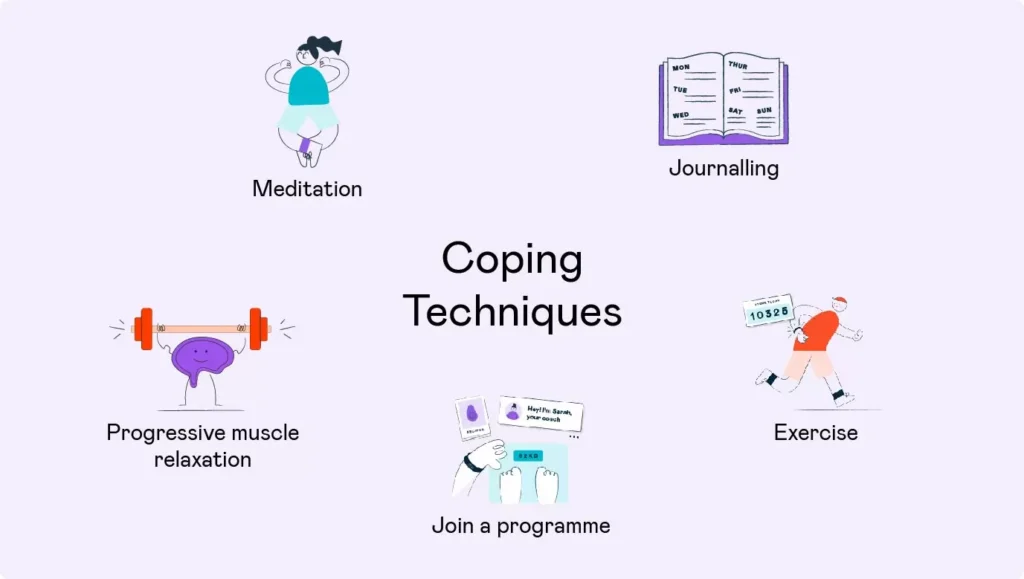
Management of stress
Relaxation methods

Include relaxation methods in your daily practise to lessen stress. The mind can be calmed and relaxation encouraged by deep breathing exercises, progressive muscular relaxation, guided imagery or mindfulness meditation.
Time for leisure and enjoyment
Schedule time for leisurely pursuits that will help you unwind. A break from stress and a sense of fulfilment can be found through engaging in hobbies, pursuing interests, spending time with loved ones, or partaking in leisure activities.

Cognitive restructuring

Challenge unfavourable or unreasonable attitudes that fuel stress by engaging in cognitive restructuring. Practise changing your negative thought patterns to more optimistic and realistic ones. Substitute self-compassion and self-encouragement for self-critical ideas.
Management of stress
Seek professional help if needed
If necessary, get professional assistance. If stress starts to seriously affect your everyday life or becomes overwhelming, think about getting help from a mental health specialist. They can offer direction, assistance and therapy methods customised to your unique need.

Keep in mind that stress management is a continuous process and different approaches may be more effective for particular people. It’s critical to figure out what suits you best and to practise patience and self-care during the healing process. Stress can be successfully controlled with proactive actions and a thorough strategy, resulting in an improvement in general well being.
exercise for stress relief ?

Exercise helps release endorphins, boosts mood, and enhances general well being, making it an effective stress reliever. Here are some activities that can help you feel less stressed:
aerobics Exercise

Exercises that get your heart rate up and your body moving, such as aerobics, are good for reducing stress. Running, jogging, cycling, swimming, dancing, and aerobic classes are a few examples. On most days of the week, try to get in at least 30 minutes of moderate-intensity aerobic activity.
Management of stress
Yoga

Yoga is a great practise for reducing stress since it includes physical activity, breath awareness and mindfulness. It encourages calmness, adaptability and power. To learn the fundamental positions and sequences, look for beginner-level yoga courses or watch online yoga videos.

Core Asana Accupressure Mat Massager For Foot, Back, Neck Pain Relief, Reduce Stress & Tension With Inbuilt Pillow (Asparagus Green)
CUSTOMIZABLE — Our three-paneled AcuTech Mat is adjustable. It can be unzipped to use it for any part of the body and folded to be stored conveniently.
UNIQUE DESIGN — Our AcuTech Mat with its trademarked design has an extended cushion to support the neck so that you can relax comfortably for long hours.
ADVANCE TECHNOLOGY — The advanced heat fusing technology for injecting spikes on the mat totally eliminates use of adhesive/ glue.
ECO FRIENDLY — The outer cover of the mat is made with 100% cotton dyed with natural hypoallergenic dyes, while the mattress is 100% natural coconut fiber.
DESIGNED BY AN EXPERT — Acutech Mat is designed by an acupuncturist in a manner to ensure that the contours of the mat fit your body beautifully.
MASSAGERS — 204 round massagers with 27 points on each. Massagers are made with ROHS certified HIPS plastic (Approved by European Union).
ERGONOMIC DESIGN — Our modern design allows the mat to trigger the body’s self-healing mechanisms for radiant health.
Dimensions — 2.7 ft x 1.5 ft (open) | 1 ft x 1.5 ft x 0.4 ft (folded)
Tai-chi

Tai Chi is a soft, low-impact exercise that incorporates deep breathing and leisurely, flowing movements. Balance, flexibility, and mindfulness are all enhanced. To learn and practise the moves, enrol in a Tai Chi class or refer to instructional DVDs.
Mindful talking

Go for a walk while being conscious to take a break from your daily routine. Pay attention to your surroundings, the feel of the ground beneath your feet and your breathing. A thoughtful walk can help you unwind, lower your stress levels and clear your head.
Management of stress
HIIT

High-intensity interval training (HIIT) involves quick bursts of vigorous activity and quick rest intervals. Pent-up energy and stress can be released through this kind of exercise. Online resources for HIIT workouts are available, as are consultations with fitness experts.
Dancing

Dancing is a creative and enjoyable way to decompress. Join a dancing class, watch dance fitness videos, or just play your favourite music loudly and dance around your home. Let go and take pleasure in the motion.
Outdoor activities

Being in nature helps to relax the body and mind. Take into account outdoor pursuits like gardening, hiking, nature excursions or sports. Your overall health can be enhanced and stress can be decreased by spending time in nature.
Always pay attention to your body and select workouts that suit your fitness level and that you love doing. As your fitness level improves, start out slowly and progressively increase the intensity and time.
To experience the long-term reductions in stress levels, aim for regular physical activity because consistency is crucial when using exercise as a stress relief method.